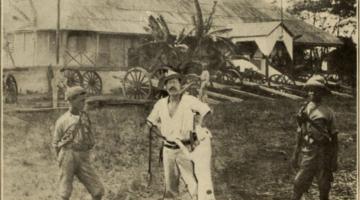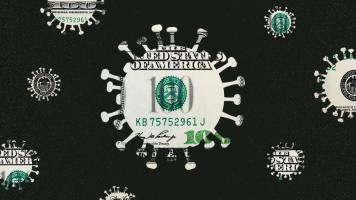Unilever Caribbean Ltd workers protest outside the company’s compound in Champs Fleurs, Trinidad. August 2019. Photo by Narissa Fraser.
The global south is bombarded with exploitative corporations that control the economic conditions of the countries in which they operate. Unilever is among them, one of the leading corporations pillaging the Caribbean.
Originally published in Clash!.
On May 14, 2024, UNILEVER Caribbean Ltd (UCL) reported an after-tax profit of $6 million for the quarter ending March 31, 2024. This represents a 147.2% increase compared to the same quarter in 2023. UCL’s chair Daniela Bucaro cheered this increase as evidence of the company’s “emphasis on driving profitable growth for long-term sustainability.” Corporate officials, local politicians, and union chiefs alike may celebrate Unilever profits under the liberal guise of “productivity” and “development.” However, these profits are no measure of progress or liberation for Caribbean workers. Unilever has been one of the longest operating and most exploitative companies in Trinidad and Tobago, squeezing profits from local toilers since 1948. We cannot and will not be fooled into celebrating our own oppression in the post-colonial era. As working people in Trinidad and Tobago recently commemorated Labour Day (June 19) and are currently gearing up to mark Emancipation Day (August 1) and constitutional Independence (August 31), it is crucial that we recognize their constant struggles not only against profit-seeking Unilever, but against global capital in general and neoliberal globalization. Further, these profits are more evidence of neocolonial misleadership and how union bureaucracies are failing workers. Only through an independent mass movement for the autonomy and self-reliance of working people will the exploitation of labor in peripheral nations come to an end.
From the company’s inception in the 19th century, Unilever’s business model was based on plundering the colonies and squeezing blood and sweat out of ordinary toilers. William Lever and his brother James founded the company Lever Brothers in 1885 in England, which specialized in the production of household soap. Within just a few years, the company had tentacles stretching from the UK and Europe to West Africa and the United States. Lever Brothers embodied global capitalism and imperialism par excellence. Warmly welcomed to the Belgian Congo by genocidal exploiter King Leopold II, the company established large scale plantations there over forested land between 1911 and 1918 from which to source palm oil.
These plantations relied upon the brutal system of forced labor of Africans, which not only required thousands of men to work under horrific conditions for little to no remuneration, but also compelled droves of other Africans to supply food to the workers. Following a merger with Dutch margarine producers in 1929, the newly amalgamated company, Unilever, became one of the biggest industrial conglomerates in Europe.
Massive expansion continued into the 1930s. Unilever acquired other companies that had operations across British colonial possessions in West Africa, such as United Africa Company (UAC), and functioned as the multinational nucleus focusing on exporting manufactures made in Europe and later overseas production by subsidiaries. With tentacles in rubber, plastic, cement, textiles, beer, soap, palm oil, timber, ocean liners, and construction equipment, Unilever held significant control over colonial economies and large proportions of working people. By the end of the 19th century, the company had played a leading role in ending the self-sufficiency of African economies, forcing a shift from non-capitalist relations of production toward exports and mass consumption. Lever Brothers could do all this through the active support and assistance of colonial regimes wherever in the world they had operations. It was decades ago that Walter Rodney, prominent Guyanese Pan-African Marxist historian and revolutionary, exposed how Unilever accumulated wealth through colonial exploits in Africa. And to this day, Unilever extracts from laboring people and ecosystems by massacre and murder, land-grabbing, labor super-exploitation, including the triple oppression of gendered and sexual demands of women workers.
Trinidad and Tobago working people were swept into Unilever’s ever-expanding web of domination in the late 1920s. Unilever has been operating in Trinidad and Tobago for over 75 years through its subsidiary now called Unilever Caribbean Limited (UCL, renamed from Lever Brothers West Indies in 2004). The origins of UCL trace back to 1948 when Unilever acquired and merged two companies that were producing crude soaps and fats in the colony since 1929 — Trinidad Manufacturing and Refining, and West Indian Oil Industries — under the name Lever Brothers West Indies Ltd. Laborers built the Lever Brothers factory in Champs Fleurs in 1960 and workers there produced household soaps, packaged margarine and shortening, and bottled cooking oil.
In Trinidad and Tobago too, Unilever and fellow foreign multinationals such as the sugar giant Tate and Lyle and oil companies like Texaco and British Petroleum squeezed super-profits out of the workers. The logics of capitalist exploitation meant meagre wages for the workers, persistent worker retrenchment, unjustified dismissals, dangerous working conditions, refusal to pay sick leave, pensions, and other benefits, worker intimidation, racism and gender-based discrimination. And, in response, workers organized. Between constitutional independence in 1962 and today, there has not been a decade where Unilever workers in Trinidad and Tobago did not strike. Some of the most prominent face-offs between workers and Unilever occurred in the 1970s and 1980s, when these workers struck alongside hundreds of others in the factories lining the East-West corridor, including Bermudez, McEarney, Neal and Massy and others. The political misleadership in the Trinidad and Tobago state facilitated these companies’ profits by routinely disbursing repressive forces to squash worker mobilization.
Today, after sixty years at its facility at Champs Fleurs, UCL has ceased manufacturing, production, and warehousing operations in Trinidad, retrenched over 100 workers, and sold the property. But UCL has not left Trinidad. As part of its new “global strategy,” UCL is now a distribution center for products manufactured in Unilever facilities elsewhere in the Caribbean and the world, including popular brands like Breeze and Cif in home care, Lifebuoy, Dove, Axe, Degree, Suave, and Tresemme in personal care products, and Lipton Teas and Breyers in the food category. Further, it opened a shiny new headquarters in Port of Spain in 2023, where a handful of local professionals compete for “dress-suit”/ “suit-and-tie”/ “white collar” jobs, all just marketing to create the illusion of benefits to peripheral nations and cover their methods of siphoning wealth out of working people.
The causes and impacts of Unilever’s departure from manufacturing in Trinidad and Tobago is consistent with the deep history of peripheralized economies’ structural dependence on foreign capital. It is well known that Unilever’s business decisions are made not in reference to the local economy or welfare, but to the interests of shareholders and the most lucrative market opportunities. The company’s announcement of its “Growth Action Plan,” which involves scaling back its range of products in light of declining revenues in recent years, separating from ice cream, focusing only on brands that account for the largest proportion of sales, and pushing for greater productivity is a strategy that screams of the bottom-line and thinks not at all of workers’ well-being. Furthermore, worker agitation in response to the company’s oppressive policies and conditions no doubt elicited little pause from decision-making headquarters eager to rid themselves of a workforce that dares to demand a decent standard of living. This is all consistent with the logic of accumulating profits.
This begs the question: Who is defending worker interests? The Rebel-led Oilfield Workers Trade Union (OWTU) under President General George Weekes once represented Unilever workers in Trinidad and Tobago. In 1967, the OWTU constitution was formally amended to allow non-oil workers to join the union. Mottos like “A Blow to One is a Blow to All” reinforced the principle of solidarity across industrial sectors. The OWTU, other radical unions, and the Black Power movement of the late 1960s had forced the Trinidad and Tobago state to step in and save workers’ jobs through nationalization. The state acquired (by purchase) foreign companies in the commanding heights of the economy such as British Petroleum in 1969, Caroni in 1975, and Texaco in 1984 that were abandoning their assets in the country for more profitable opportunities elsewhere.
Today, however, this militant worker movement is long gone. Neoliberal restructuring, state repression, political co-optation, and internal organizational conflicts over leadership and strategy have reduced union membership, weakened militance and direct action, undermined the union’s stance of solidarity with workers in non-oil/energy sectors of the economy, and constrained its ability to effectively represent workers in other industries. Without any organized mass pressure making coherent, anti-capitalist, anti-imperialist demands for economic, political, and social transformation, the likes of Unilever have free reign to abuse and discard workers as they please. Worse, it seems that a defeatist wave has swept over the union as UCL’s OWTU Representative Neil McEachnie was quoted saying, while the retrenchment is something that “nobody wants, it is something we have come to accept.” Who is “we?” The constant conflation of the laboring people with union leaders, the nation, and the society has consistently resulted in the elevation of capital’s concerns over labor’s.
In any case, nationalization did not and does not end worker exploitation; it only persisted under the new management of the state. Public and nationalized property might have stemmed retrenchment in the short-term but this arrangement is categorically different from worker self-direction where workers occupy and control the means of production. Those who advocated linking nationalization and worker self-management, such as the ULF campaigns of 1975 to 1977, were sidelined from the movement. Furthermore, imperial states and global capital retaliated against the Trinidad and Tobago state for conceding to worker demands for greater protections and taking on a more prominent role in directing and managing the economy. These punishments included everything from court actions, evading taxes, and requesting that the US State Department pressure the Trinidad and Tobago state. Nationalization in a global capitalist system characterized by peripheral states’ dependence on foreign capital and markets did not overturn the systems of accumulation and exploitation that oppressed workers.
Could the workers at Unilever take over the factory and manage production on their own? Of course, but one of the major obstacles to worker-owned production in Trinidad and Tobago is the neocolonial state. For instance, in 2018, oil workers under the aegis of the OWTU had tried to purchase Petrotrin to save the oil refining industry from state and foreign ownership. “The Alternative Plan” would have brought the facilities into employee ownership. But the government undermined this effort to ensure that workers would never realize their dreams of autonomy and self-determination. Workers can also invade, occupy, and control the means of production and sustain themselves in a world where capitalist social relations no longer prevail, but we have yet to observe advances in this direction in contemporary Trinidad and Tobago. The union bureaucracies seem more concerned with political party alignments than with activating the political force of the working class as a whole. This is where proposals for “union ownership” of the means of production differ from “workers ownership.” Unions today must look to their origins in the tenacity of ordinary women, men, and children in 1919, in the Butler- and François-led movement of the 1930s, and Rebel faction under George Weekes in the 1960s-1970s to see that workers do not need to be directed by their union chiefs, but rather, they can and do mobilize on their own authority.
In the meantime, the layoffs and termination of manufacturing have no doubt contributed to unemployment and increased family hardship along the East-West Corridor and beyond. It is not Unilever alone. In the last few years, workers have been retrenched at a number of companies, including the Telecommunication Services of Trinidad and Tobago (TSTT), Digicel, and Massy. The economic pressure, social dislocation, and the criminalization of low-income Black and Indian youth are inflating as much as the prices of basic goods, like the same soap now being imported for distribution by UCL.
As working people in Trinidad and Tobago warn, “pressure does buss pipe.” They will not be fooled. UCL’s “growth,” like all profits in the global capitalist system, are profits built on the backs of laboring people. There is a long history of worker organizing against the racist imperial exploits of Lever Brothers, its descendants, and its subsidiaries in Trinidad and Tobago and around the world. Through reflection, re-tooling, and re-organization, it is these working people who will chart a new course for our collective liberation.














